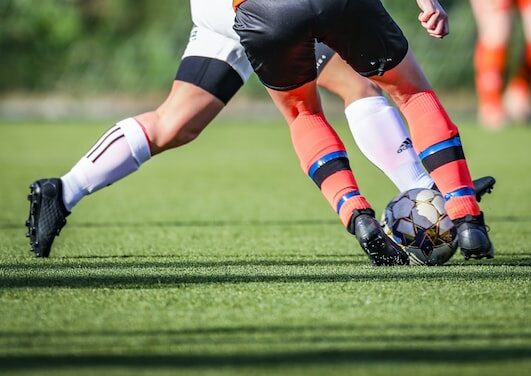Sarah Lewis, now an associate professor of History of Art and Architecture and African and African-American Studies at Harvard University, once visited the all-women archery team of Columbia University, New York, to watch them train. The archers were preparing for an upcoming national-level competition. As each competitor drew and then unleashed arrow after arrow from her bow towards the bull’s eye located 225 feet away, Lewis watched on fascinated.
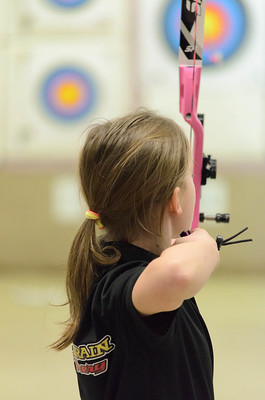
“The 10-ring (the bull’s-eye) from a 75-yard (225 feet) distance, looks as small as a matchstick tip held out at arm’s length,” said Lewis during a TED talk she gave in April 2014.
Though Lewis did not have binoculars with her and could not clearly see if the archers were hitting their targets – depending on the varsity team’s coach to update her on how the team was doing – she stayed for 3 hours.
Recalling the performance of one particular archer, Lewis said, “She first hit a 7, I remember, and then a 9, and then two 10s, and then the next arrow didn’t even hit the target. And I saw that gave her more tenacity and she went after it again and again.”
“I stayed (for 3 hours) because I realised I was witnessing what’s so rare to glimpse,” said Lewis. “That difference between success and mastery. So success is hitting that 10-ring, but mastery is knowing that it means nothing if you can’t do it again and again.”
Lewis explored the theme of mastery in an acclaimed book, ‘The Rise: Creativity, The Gift of Failure, and The Search for Mastery’, which was published in 2014 and became a bestseller.
As part of writing the book, Lewis studied hundreds of achievers from disparate fields to discover the nature of mastering a craft, an eclectic pool that included, among others, archers, inventors, weavers, choreographers and explorers. Lewis explained in her TED talk how, in the course of writing the book, she discovered that mastery “is in the reaching, not the arriving. It’s in constantly wanting to close that gap between where you are and where you want to be.”
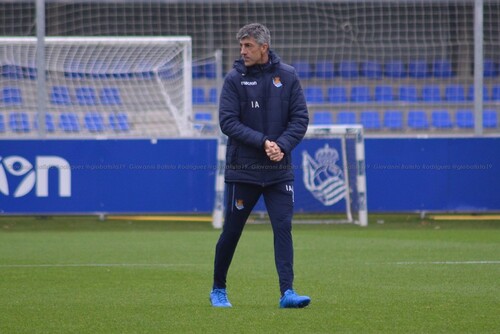
For the past few seasons under Imanol Alguacil, Real Sociedad have been gradually closing the gap between them and the elite – playing more attacking football, qualifying for Europe, winning trophies. They’re not at the summit yet, but are striding ever forward. Alguacil already has La Real shooting for the stars this season – they’re currently fourth in the La Liga standings, behind the traditional ‘big three’ of Barcelona, Real Madrid and Atletico Madrid. If the club based in the city of San Sebastian hold their position till the end of the season, it will be the first time La Real have qualified for the UEFA Champions League since the 2012-13 season, when the side under Frenchman Philippe Montanier finished fourth in the table.
Alguacil has previous when it comes to making history with La Real – he ended Sociedad’s 34-year wait for a trophy when he led them to the 2020 Copa del Rey trophy. The former right-back’s passionate celebration of the cup win during the post-match press conference, when he put on a Sociedad jersey over his T-shirt before breaking into an astonishingly lusty song of celebration, went viral.
“This is for all of you, Guipuzcoa!” exclaimed Alguacil, who was born in the Basque region of Gipuzkoa. “For all those who feel the Real! Come on Real! Real! Come on, Goazen!”
‘THE BIGGEST CLUB IN THE WORLD’
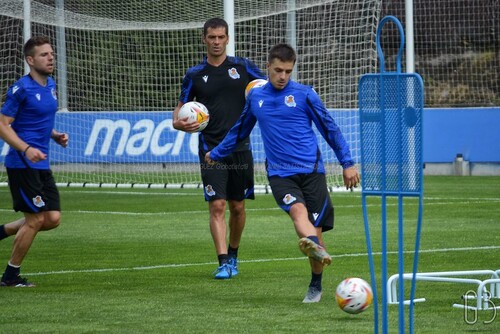
Almost 2 years after Sociedad won the 2019-20 edition of the Copa del Rey, Alguacil was at another post-match press conference. Wearing a grey turtleneck pulled over a crisp white shirt, the 51-year-old waited patiently for the journalist to finish posing his question. Then, with the mild annoyance of someone who’d just been asked to state the blindingly obvious, Alguacil said, “For me, sorry, with all due respect, Real Sociedad is the biggest team (there is).”
The La Real coach had just been asked in the aftermath of his team’s 0-1 defeat to Barcelona in the Copa del Rey quarterfinals on whether he thought that Martin Zubimendi, the Sociedad midfielder, was now ready to play for a ‘big team’ like Barcelona.
While some may frown upon Alguacil claiming that Sociedad are the “biggest club there is”, a glance at his playing and managing career would make it clear it was the only answer he would give. Alguacil is now in his twenty-third year with Sociedad, starting with his stint in San Sebastian as a youth player at the age of 17, then first-team player, youth team coach, assistant coach, interim coach, and then head coach.
“Since Imanol arrived (as manager), he has made it very clear what he wants. The way he transmits his ideas means he gets the best out of us,” La Real midfielder Mikel Merino said last season.
“And the other reason we are doing so well is the academy. We have a team that is well-balanced, with a few players from abroad who bring things that players from here don’t have, but also home-grown players, who make the fans proud.”
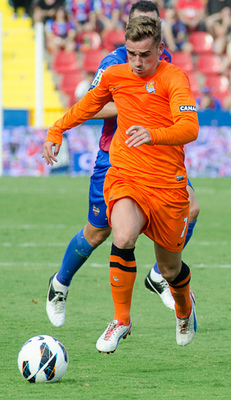
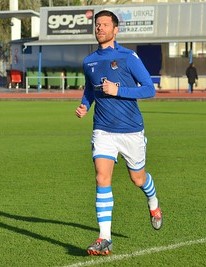
Alguacil himself is a product of Zubieta, the famed Sociedad academy that predominantly picks players from the Basque region in Spain where it is located, and has produced talents such as Xabi Alonso and Antoine Griezmann over the years. Sociedad’s current first-team squad of 25 players has as many as 16 who are graduates of La Real’s academy, many of them former wards of Alguacil from his days as the reserve team coach.
Alguacil has been head coach at Sociedad since 2018 and the current campaign is his fourth full season in charge. Since guiding La Real to a 9th place finish in his first season – he took over in December 2018 from Asier Garitano with the team in 15th place – Alguacil has helped Sociedad qualify for Europe in each of the following seasons. (He has finished 6th, 5th and 6th between the 2019-20 and 2021-22 seasons).
A fourth successive qualification for Europe would equal a long-held club record, set during the early 1980s when La Real won two consecutive La Liga titles.
STRETCHED TO THE LIMIT
This season has been a particularly testing campaign for the txuri-urdin (so called after the ‘white-blue’ colour of their kit), whose squad has been stretched to the limit at times after losing key players to injury or transfers at critical moments of the year. But they have managed to forge ahead regardless.
In late August 2022, with the season already underway and just days left before the summer transfer window closed, Sociedad sold striker Alexander Isak to Newcastle United after receiving a mouth-watering offer of €70 million. La Real’s replacements for Isak were Umar Sadiq, signed from Almeria for €20 million, and Alexander Sorloth, signed from RB Leipzig on loan.
In Sadiq’s third match for Sociedad after he had scored in his debut against Atletico Madrid, the hulky Nigerian ruptured a cruciate ligament and is yet to return to action.
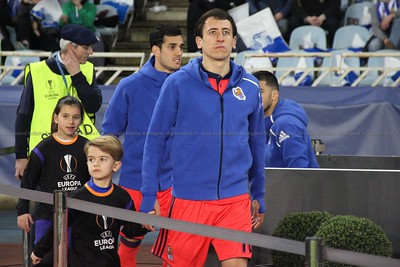
Winger Mikel Oyarzabal, arguably Sociedad’s biggest attacking threat, missed 22 matches in all competitions this season before returning to action following a cruciate ligament injury he sustained the previous season, in March 2022.
David Silva, the veteran who orchestrates La Real’s play with silky nonchalance whenever he is fit to play, has missed 9 matches this season due to injury and only recently returned to the line-up after another spell on the treatment table.
Injuries to the first- and second-choice right-backs, Andoni Gorosabel and Alex Sola, forced Alguacil to field centre-back Aritz Elustondo as cover for them. After Elustondo injured his ankle, promising winger Ander Barrenetxea deputised for him. The 21-year-old Barrenetxea himself has missed 16 matches this season due to injury.
Nineteen-year-old French striker Momo Cho, signed for €12 million from Ligue 1 side Angers in the summer, has been sidelined most of the season due to a spate of injuries.
“What this team is doing is outrageous, in the face of casualties and injuries,” said Alguacil after Sociedad ended their Europa League group stage this season as winners of Group E, which also contained Manchester United, Sheriff Tiraspol and Omonia.
“They’re competing like beasts. The only thing I ask of them is that we are proud of them, and I’ve been very proud of them for a long time.”
A NEW STAR EVERY WEEK
With almost two-thirds of the season already over, it’s hard to single out any one player as having been the most decisive so far in La Real’s campaign. The sum has always been greater than the parts.
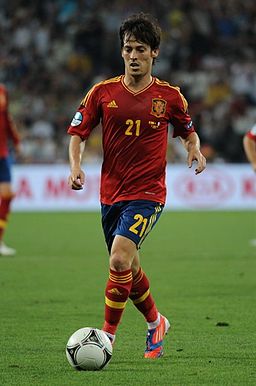
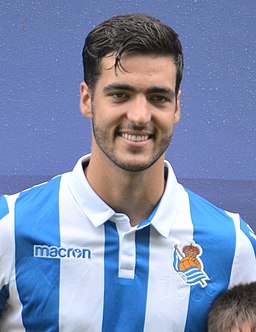
Sociedad’s season has been spearheaded at different times by different players: midfielder Mikel Merino (with 7 assists, the second most in La Liga), winger Takefusa Kubo (a 21-year-old Japanese international who’s having a breakout season after transferring from Real Madrid, where he never got a chance to show his ability), summer signing Brais Mendez (a €14 million midfielder from Celta Vigo who has hit the ground running in San Sebastian), Martin Zubimendi (a 24-year-old defensive midfielder who anchors Sociedad’s midfield and is linked with a move to Barcelona and Arsenal), striker Alexander Sorloth (a Norwegian who has excelled as centre-forward after Sadiq’s injury and is La Real’s top scorer so far with 9 goals) and goalkeeper Alex Remiro (a former Athletic Bilbao youth team product who has proven a reliable presence between the sticks ever since joining Sociedad in 2019).
Besides the above, Silva has proven decisive whenever he’s been fit to play and the Sociedad defence has held firm even when it has had to cope with an injury crisis.
ON ROCKY TERRAIN, BUT STILL STANDING
After a solid run of form which saw Sociedad reach and retain third place in La Liga for 10 rounds this season, the txuri–urdin have hit a rocky patch of late. They have won only 1 of their last 9 matches across competitions, including Sunday’s 1-1 draw with Mallorca.
This recent run has served to highlight 2 main issues that have been hampering Sociedad like pebbles in their shoe this season:
a) A Relative Impotence in the Final Third of the Pitch
b) Their Home Form
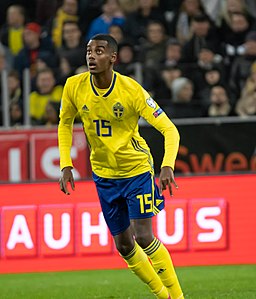
Sociedad have failed to score in 6 of their past 9 matches.
Under Alguacil, the txuri-urdin are capable of switching from defence to attack almost instantly with brilliant one-touch football, but they struggle to put away the chances they create. “Once again, it has been shown that these games are too big for us,” said an angry Alguacil after Sociedad lost 0-2 to AS Roma in the first leg of their Europa League Round of 16 tie on Thursday.
“We can debate for days about what happened between the two (penalty) boxes, but if you’re not effective in the boxes, it’s all for nothing,” the coach said after the match in Rome.
After conceding early against Jose Mourinho’s men — who dominated them in physical and aerial ability — Sociedad had an opportunity in the second half to equalise. However, Mikel Merino failed to put it away.
Minutes later, Albanian centre-back Marash Kumbulla headed in a goal from a corner to extend Roma’s lead. “We had a very clear opportunity to score and then we gave away the 2-0, these things can’t happen if you want to compete at this level,” said Alguacil.
If the defeat to Roma called to attention Sociedad’s scoring troubles, their match leading up to the encounter in Italy highlighted another curious staple of their season: their home form.
In their match against Cadiz on March 3, a home match for Sociedad, La Real created enough chances to win the game but failed to score. The match ended 0-0.
Sociedad’s form at the Anoeta, their home stadium now called the Reale Arena for sponsorship purposes, has seen them win only 5 of the 12 La Liga matches they have played there this season. In contrast, they have won 8 of the 13 La Liga matches they have played away from home so far.
“I think Thursday night (we) can make history, and at least I’m going to feel that way until Thursday. We have to go out to the field to kill and leave the field dead.”
Imanol Alguacil on the upcoming Europa League return leg against AS Roma
Despite dropping 2 points against Cadiz, which meant Sociedad had then collected only 6 points from their past 6 league matches, Alguacil refused to press the panic button.
“This is football in the first division, and all the teams go through moments in which results don’t come to them. We are not going to be different from others,” insisted the Sociedad coach.
“Talking about the Champions League on matchday 15 seems surreal to me, especially because of the level there is. What I can understand is that we are required to give our best and try to repeat what was done in the first (few) rounds, even if it’s difficult”.
On March 16, next Thursday, Sociedad will play arguably their biggest home match of this season: the Europa League return leg against Roma, with an aim to overturn a 0-2 deficit. Speaking to the press after Sunday’s 1-1 draw with Mallorca, in which La Real had dominated the first half and had led 1-0 but ended up dropping 2 points, Alguacil said, “Thursday night (against Roma) could be a historic night and I feel that way, and the players too. Today we wanted to win, because it always helps, but it couldn’t be.”
On Sunday, Sociedad had failed to adequately cope with a tactical rejig at half-time by Mallorca coach Javier Aguirre — he changed his team’s formation at half-time from 5-3-2 to 4-4-2 — but Alguacil continued to be upbeat about the future.
“I think Thursday night (we) can make history, and at least I’m going to feel that way until Thursday. We have to go out to the field to kill and leave the field dead,” he said.
Though it may seem unusual for a coach to sound so confident after the run of form that Sociedad have endured of late, Alguacil had good reason to be phlegmatic. The La Real that he is building, the Spaniard knows, is a long-term project. Hiccups are inevitable.
THE DUO BEHIND THE SCENES
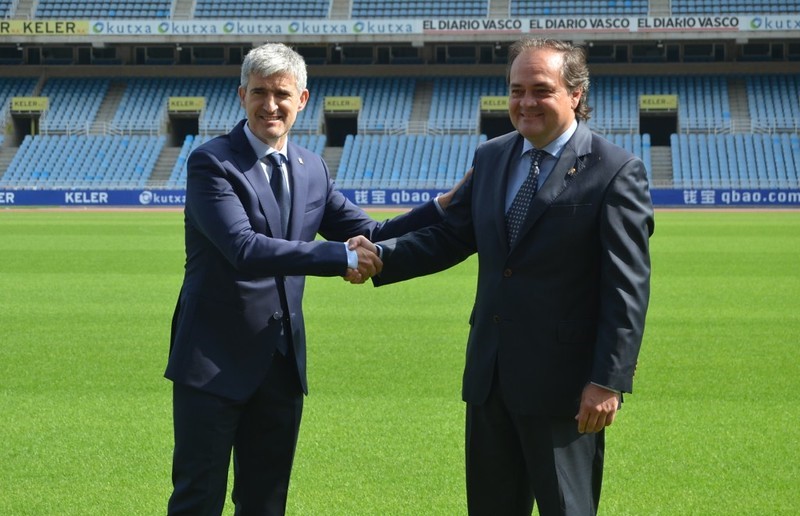
The recent patchy form of Sociedad aside, Alguacil has been a massive success as coach – for which he has 2 men in particular to thank: La Real sporting director Roberto Olabe and Sociedad president Jokin Aperribay.
Olabe, a former goalkeeper and one-time teammate of Alguacil’s during their playing days at La Real, took over as sporting director in April 2018. It’s Olabe’s third go at the job, and under his guidance Sociedad have continued to sign the brightest talents in the Basque region for Zubieta, while also swooping up highly regarded talents at a snip of their market price.
Olabe, who is one of Europe’s most highly regarded sporting directors, recently spoke about an unorthodox technique he follows: he waits for his best ideas to come to him at night.
In his almost 5 years on the job, Olabe has overseen a cumulative spend of around €97 million on incoming transfers while earning around €153 million over the same time in outgoing transfers.
“Night is dangerous, but it is the time you use to think, being aware that many times it is not the best time because it is dark, but I do have that habit that I think the best ideas will come to me when the world is stopped and there is no ray of light,” Olabe said in ‘Arquitectos’ , a podcast produced by La Liga that focuses on the work of sporting directors in Spanish football.
“It is a belief, but it is dangerous, because the projects are not overnight. Ideas can be overnight, but projects need stability and time, perseverance, error, restart… in short, imperfection,” Olabe said.
In his almost 5 years on the job, Olabe has overseen a cumulative spend of around €97 million on incoming transfers while earning around €153 million over the same time in outgoing transfers. These include signing striker Alexander Isak for €8 million (eventually sold for €70 million), winger Takefusa Kubo for €6.5 million, midfielder Mikel Merino for €10 million, and David Silva and goalkeeper Alex Remiro on free transfers.
“We want them to get to know us beforehand,” said Olabe on La Real’s recruitment strategy. “If we have a good story inside, we can certainly transmit it. I think it will be more positive at the performance level to think: ‘If you choose me, coming to Real Sociedad, for that I have to convince you’. If you choose me and you have qualities, surely the adaptation will be more natural, better.”
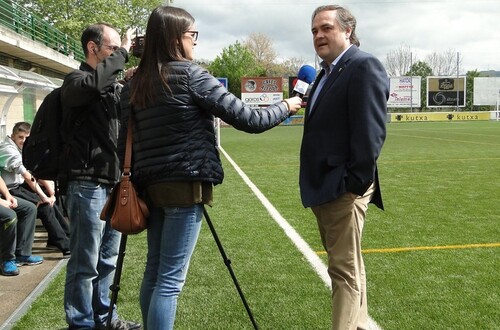
One man who did not need convincing to come to Sociedad was Jokin Aperribay. A businessman from the Basque region, Aperribay has overseen the gradual ascent of the txuri-urdin towards the top ever since becoming their president in December 2008.
Sociedad were in the Spanish second division when Aperribay took over, the club having been relegated the previous season. They had also filed for bankruptcy. Over the next 5 years, Aperribay steered Sociedad back to the first division and stabilised the club’s finances. La Real made the last payment of their bankruptcy agreement in 2013, thereby guaranteeing the continued existence of the club.
The 56-year-old Aperribay has also successfully spearheaded a €78 million revamp of the Anoeta, Real Sociedad’s stadium. After signing a naming rights deal with Italian insurance brand Reale Seguros, the stadium is now called the Reale Arena. The revamp also included an increase in stadium capacity and the removal of the athletics track that had surrounded the pitch, which means fans are now much closer to the action. “It’s difficult to grow as a club and compete in Europe when you have a running track and fans are 42 metres away from the action. It’s very difficult for them to express their passion,” Aperribay said during the reopening of the stadium in 2019 after 2 years of renovation.
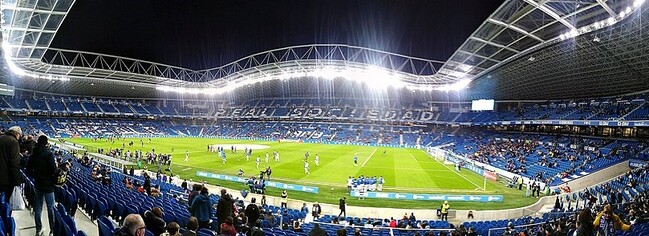
Thanks to the refurbishment, match day atmosphere at the Reale Arena has been transformed. The stadium’s capacity has increased from 32,000 to around 39,000. Thousands more have purchased season tickets and revenue has soared, as the club has exploited the marketing opportunities that come with a stadium located inside the city of San Sebastian.
In November 2022, Aperribay was elected to a fourth consecutive term as Real Sociedad president with 99.84% of the votes at the General Shareholders’ Meeting.
“There are many people looking at Real and we are very excited that Real can face sporting challenges,” Aperribay said after his re-election.
“The last five years have been magnificent, and I would like the next ones to be better,” the Sociedad president said.
“We can’t sit down to look at a photo or think about the past. We are here to look to the future.”
Having led Real Sociedad to previously uncharted territory in his 15 years as president, Aperribay knows that qualifying for Europe or winning cups may bring momentary satisfaction to the supporters, but it will all mean nothing if La Real can’t do it again and again.
Just like an archer would.
